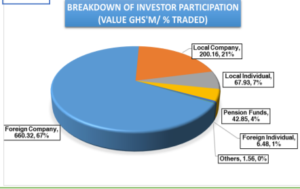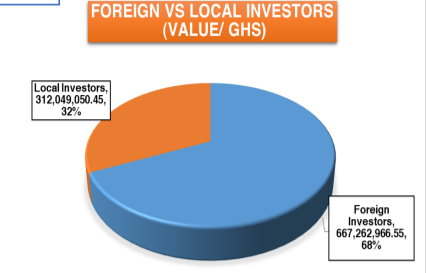Trades by domestic institutional and individual investors have soared, accounting for 32 percent of trades, measured by value, on the Ghana Stock Exchange (GSE) for the period January to November, data from the Accra bourse have shown.
The figure represents a 106.45 percent jump from the 15.45 percent contribution by local investors during the comparable period last year, and is consistent with the historical range of between 30 to 40 percent. Consequently, foreign investors’ share of value for equities traded over the period fell from 84.05 percent in 2020 to 68 percent.
According to the data, domestic traders exchanged shares to the tune of GH¢312 billion versus GH¢667billion worth of shares by offshore investors.
A breakdown of the actors showed that domestic institutional and individual investors contributed to approximately 21 percent and 7 percent of trades respectively, with pension funds accounting for four percent of the whole. Hitherto, foreign institutional investors were the dominant players on the equities side of the market – being responsible for 67 percent while the value of trade by foreign individuals amounted to 1 percent for the period under review.

With local participation accounting for a mere 13 percent in first-quarter of the year, Head of Research at Databank, Alex Boahen, stated that the recent statistics suggest recent progress – but argued that more can be done to deepen market participation, especially by local pension funds.
“This represents a healthy level of growth, especially when we consider where things were at beginning of the year; but I would say that local pension funds still have a crucial role to play in driving the market,” he remarked.
Reserving special commendation for managers of the exchange, however, he said the surge can be attributed to their extensive sensitisation campaign that has largely focused on opportunities in the equities market.
Global developments
Stock markets across the globe continue to bear the brunt of rising inflation and the measures being introduced to contain it, with markets in frontier and emerging regions being the worst hit as investors seek safety.
Over the course of the last 10 days, the US Federal Reserve has signalled the possibility of as much as three interest rate hikes in 2022 to address the development, with the central bank of England raising its benchmark interest rate – for the first time since the onset of the pandemic – to 0.25 percent from its historic low of 0.1 percent.
Norway also joined the fray, as its central bank raised its primary rate for the second time in three months from 0.25 percent to 0.5 percent.










